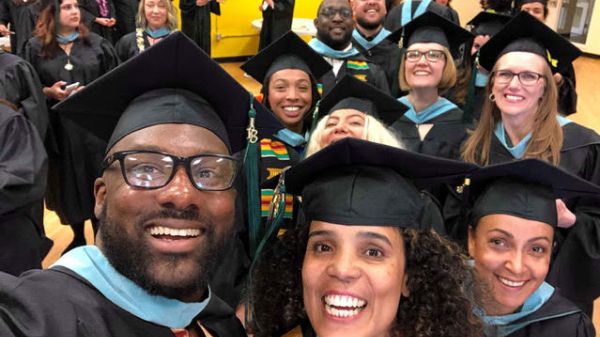Antiracist Environmental Leadership

"Antiracist Environmental Leadership" is an in-depth look into Antioch U. Seattle's UEE Program, written by Cynthia Thomashow.
The Urban Environmental Education (UEE) program is actively recruiting graduate students for our 8th academic cohort.
It is our mission to investigate how racism and social injustices impact environmental planning and design in cities. The nature of UEE class material encourages discussion that supports the telling of stories and experiences, making racism, discrimination, and injustice real. These revealing stories foster deep and provocative discussions about anti-racism, climate challenges, and inequities in urban places. How else does one confront racism than to come starkly face to face with it? Coming to terms with racism requires courage, trust, willing introspection, and truth-telling. It requires guidance from trained instructors. It requires a diverse cohort who can share personal experiences. It means learning to listen and to believe hard truths without defensiveness or resistance. I think that we’ve managed to create a learning environment that insures honest and necessary sharing.
At this point in the 15-month program, the students are out on the streets identifying how a city runs and what systems and decision-making protocols are at work. They are standing on street corners asking hard questions about the motivations that shape neighborhoods, prompt civic engagement, and lead to environmental investigations with a lens on power, money, and privilege. Our students are challenged to quickly immerse themselves in communities by walking through, showing up, and talking with residents. They learn techniques that open up the hearts of urban communities in order to understand, first-hand, the impacts of environmental and social justice issues.
“Nothing About Us Without Us is For Us” (African proverb) is our heartfelt motto.
We pride ourselves on pioneering pedagogy shaped by an ethic of listening from the ground up and actively unpacking the influences of race, equity, and justice on policy, regulations, and growth. The students learn to challenge assumptions, confront behaviors, and support each other through difficult conversations, even while on zoom. One positive outcome of being online is the ability to invite environmental activists and social justice leaders from BIPOC-led organizations into our classes from all over the world for professional development and antiracist training.
Each closely-knit student cohort is as diverse as any urban community. 75% of our faculty are BIPOC (Black, Indigenous, People of Color) practitioners/professionals. 60% of our students identify as BIPOC. Using the rich diversity of perspectives and life experiences present in each student cohort, we aim to cultivate authentic and visceral skills in antiracist environmental leadership. Our courses dive deeply into how race, inequity, and social justice impact communities and influence policies on pollution, displacement, access to healthy food, waste management, lack of green space, and the impacts of climate change.
For many of our students, our courses are the first experience in a classroom with a majority of people of color. For most of our students, the Urban Environmental Education (UEE) program is their first academic experience with mostly BIPOC instructors. All students are deeply moved by the revelations of how racism, inequity, prejudice, and justice have impacted the lives of their colleagues. That growing awareness leads to unpacking the ways that we are governed, and learning how policies are created and how decisions that shape our society are made. With intentionality, an antiracist narrative emerges where policies, organizational behavior, governance, ways of knowing are investigated for their potential racist outcomes. We begin to identify ways of working together that are egalitarian, just, and emancipatory.


